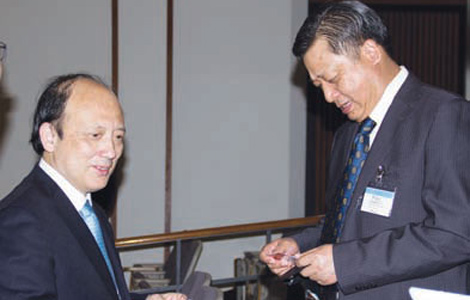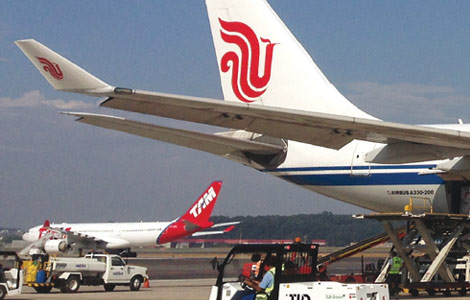Jumei IPO on NYSE raises $245.1 million
Updated: 2014-05-16 23:15
(China Daily USA)
|
||||||||
 |
|
Jumei International Holding Ltd. adorns the New York Stock Exchange on Friday. The company said it sold 11.1 million American depositary shares at $22 apiece Friday in an IPO that raised about $245.1 million. (MICHAEL BARRIS/CHINA DAILY) |
In another sign of the easing of the US freeze on IPOs from China, Jumei International Holding Ltd, a Chinese online cosmetics retailer benefiting from the expanding beauty and personal care products market, raised $245.1 million in a US initial public offering on the New York Stock Exchange.
"It sure looks like the US listing gates and IPO window is open for Chinese shares despite the difficulties many US tech companies are having," Max Wolff, an analyst at Citizen VC, told China Daily. "Weibo, JD.com, Jumei .... It very much looks like there is an appetite, although major concerns exist."
Beijing-based Jumei, backed by US venture capital firm and 19 percent shareholder Sequoia Capital, said 11.1 million of its American depositary shares were sold at $22 apiece in Friday's IPO. The size and sale price of the offering topped expectations. The company's IPO plan, filed with the US securities regulator in April, described a potential offering of 9.5 million shares in a range of $19.50 to $21.50 per share. Managers of the offering were granted an option to sell up to an additional 1.67 million shares to meet demand.
Trading under the ticker symbol JMEI, Jumei's stock opened Friday at $27.25 and rose as high as $28.28. It closed at t $24.18, or 9.9 percent above its offering price.
Jumei's 30-year-old CEO and chairman Leo Ou Chen. Chen's holds a 41 percent stake in the company. Chen, joined by members of the company's management team, rang the opening bell at the NYSE.
For two years the market for US listings from China was in a deep freeze as accounting scandals involving Chinese shell companies created through reverse mergers created a chilly investment climate for the group.
The recent steady flow of Chinese technology companies or companies with a strong technological flavor going public in the US underscores the heightened US climate for Chinese offerings. Part of that fervor has been fanned by e-commerce giant Alibaba Group's pending IPO later this year, expected to be one of the largest ever.
The surge also reflects US venture capital firms' willingness to invest in IPOs from China. Sequoia has invested more than $10 million in Jumei, which reported sales of $483 million last year and has a 22.1 percent market share. The company is a middleman that ties brands to consumers, mainly targeting women. Besides cosmetics, it sells apparel, leatherwear, and small appliances.
"American investors have become more comfortable with Chinese IPOs, having purchased nearly a billion dollars in Chinese initial shares in 2013," analyst Don Dion wrote on the Seeking Alpha investment website.
Wolff called Jumei "perfectly positioned to take advantage of rising incomes, urban populations, smart phones and consumer spending" in China. The company "has posted strong growth figures the past few years, and has strong leadership," Dion wrote. Jumei "is on the rise at an ideal moment in China, a country with both growing interest in online shopping and an expanding market for beauty products," Dion's commentary said.
Total retail sales of beauty products in China increased to $36.5 billion in 2013 from $22.5 billion in 2010, according to research firm Frost & Sullivan. Beauty-product sales in 2018 are seen reaching $71.3 billion, boosted by online orders in the world's largest Internet community.
"Chinese consumers are becoming increasingly conscious about their appearance, especially China's young generation, and are willing to spend more to enhance their appearance," Jumei said in its IPO prospectus. "As a result, a wide range of beauty products have become an irreplaceable part of Chinese customers' daily routines."
Jumei said it had 10.5 million active users in 2013, up from 4.8 million in 2012. It works with 1,700 suppliers and third-party merchants. The company has invested heavily to build a mobile platform, which accounted for 49 percent of first-quarter gross merchandise volume, up from 38 percent in the prior quarter. For all of 2013, profit more than tripled from a year earlier to $25 million and revenue more than doubled from to $483 million.
Chinese online retailer JD.com Inc. is expected to price a US IPO next week. Although JD.com — which operates as a direct seller, rather than like Alibaba as a marketplace that connects suppliers and buyers – filed for a $1.5 billion US initial share sale in January, the deal's value could go up dramatically.
Tencent Holdings Ltd., Asia's largest Internet company, has said it will acquire a 15 percent interest in JD.com and will transfer its e-commerce business onto that site. Tencent has assigned JD.com a valuation of more than $20 billion by the time it goes public, Bloomberg News reported, citing statements by two people who asked not to be identified because the information is private.
"We really like JD.com," Wolff said in an interview. "With over 42 million monthly customers, a huge infrastructure, a delivery team, JD really is the Amazon of China. Its profits have been non-existent as it builds out a big and heavy infrastructure. The "online, mobile future in China is very, very exciting," Wolff said.
- China hosts major Asia security conference
- Xi vows support for Afghanistan reconstruction
- Security summit to help build mutual trust
- Russian president arrives for state visit
- China suspends cyber working group activities with US to protest cyber theft indictment
- China publishes latest data of US cyber attack
Most Viewed
Editor's Picks

|

|

|

|

|

|
Today's Top News
China slams indictments over cyber snooping
China's real estate market: collapse or managed slowdown?
Envoy seeks Chinese backers for key infrastructure projects
Andre Agassi will open 39 more charter schools
New JV forms world's largest auto interiors supplier yet
Improve Sino-US military ties
US envoy seeks Chinese backers for key projects
China summons US ambassador over indictment
US Weekly

|

|














